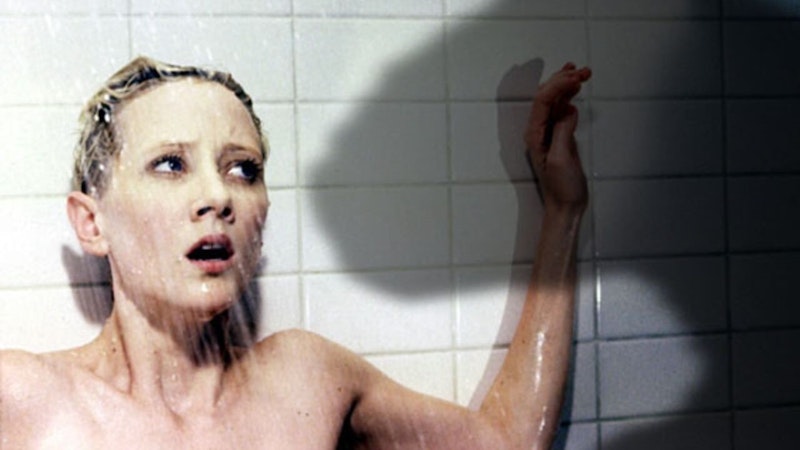I’ve written before about the American audience’s hostility towards film remakes—despite the abundance of live recordings, bootlegs, and outtakes released by famous bands every Christmas. Even if you’re not buying something by The Beatles, or even Wilco, for $600, you’ve probably heard a live version or an alternate take of one of their songs. Demos are cherished by hardcore fans, considered more than curios; the need for translation makes much of world literature a series of “remakes” varying in quality; TV pilots, un-produced or not, are rarely pirated, and certainly never discussed or consumed in any meaningful way. Do you know about the show Michael Cera might’ve been on before Arrested Development?
Pilots are locked away while classics are made into more than movies: lexical infiltration, generational merchandising, corporate branding and interior decorating for dine-in multiplexes. A succession of images and quotes denuding them of all their power: Janet Leigh drenched in the shower reaching out in vain, Roy Scheider snapping up after the shark in Jaws appears for the first time, Humphrey Bogart in a fedora and trench coat in one of a number of films. In 30 years, maybe 50, when the last movie theaters have become museums, perhaps there’ll be a wall print of Adam Sandler in Uncut Gems grinning, “This is how I win.”
Gus Van Sant could’ve done anything he wanted after the success of Good Will Hunting in 1997, and he chose to remake a classic film owned by Universal. Great, let’s make some money! For some reason, Universal got nervous when Van Sant insisted on a shot-for-shot remake: this was a conceptual project to prove that if a classic is really a classic, a shot-for-shot remake would also be a classic by default. In theory, the only thing getting in the way is bad acting; but if you truly remake a film shot-for-shot, duplicating sets and color palettes as well, as Michael Haneke did with his own Funny Games in 2007, it’ll be just as good as the original, or, at the very least, nearly as good. Van Sant’s Psycho has a handful of shot differences, but it’s a remarkable film, certainly one of Van Sant’s best—he proved himself right.
Psycho ’98 was laughed at and dismissed in initial release, quickly forgotten, but is overdue for a reappraisal. Not even the tragic death of Anne Heche last year spurred any significant look back at her admittedly limited work in Hollywood. Van Sant’s Psycho is remarkable just for how different it is from all of his other films, and most modern American movies—because this is still Alfred Hitchcock’s movie. Psycho ’98 is artifice upon artifice, stars of the day fully aware they’re “restaging” a classic, all of them phenomenal. Vince Vaughan isn’t a better Norman Bates than Anthony Perkins, but he’s not bad; Bates is an interesting enough character to warrant multiple cinematic interpretations by different actors, and to be fair to all the Psycho sequels, there’s no better showcase for that than the 1960 original.
Julianne Moore may arrive to the pawn shop where Viggo Mortensen works wearing yellow Walkman headphones, but she’s stuck in the amber of Classic Hollywood grammar and blocking, just like every other actor. Some are in period clothes—William H. Macy, Rita Wilson—while others straddle the line, like Heche, Vaughn, and Mortensen. It’s thoroughly 1997, while fitting in with the many period costumes (the costume designer assumed it’d be a period piece and gathered accordingly). Vaughn looks like he stepped right out of Swingers, and Heche is of the moment; Julianne Moore’s casual look is a little more timeless, but the bright yellow headphones—the most one thing in Psycho ’98 that screams “THIS IS A REMAKE”—date her character, too. While mostly shot-for-shot, Van Sant’s Psycho is a film of the mid/late-1990s, when remakes and TV adaptations were booming and studios generally experimented more.
And while I loathe Michael Haneke’s 1997 Funny Games, his shot-for-shot remake with Naomi Watts, Tim Roth, Michael Pitt, Brady Corbet, and Devon Gearhart is only worthwhile for proving that the same director can make the exact same film twice. Both movies are too stupid to merit any further praise, but Haneke proved what Van Sant couldn’t. Psycho ’98 comes close, but beyond Van Sant’s few aesthetic flourishes (really, more clouds?), there are certain necessary shots—like in the staircase scene—that are only there because they couldn’t figure out how Hitchcock did it. Haneke had the blueprints of the house for Funny Games, along with himself and his script, but he made it with a Hollywood cast and crew. There are minor differences, but they’re the same film. For however horrible both Funny Games are, the second one was worth the experiment.
—Follow Nicky Smith on Twitter: @nickyotissmith

